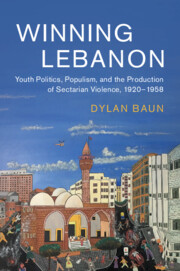Book contents
- Winning Lebanon
- Cambridge Middle East Studies
- Winning Lebanon
- Copyright page
- Dedication
- Epigraph
- Contents
- Figures, Maps, and Tables
- Acknowledgments
- A Note on Conventions
- Introduction
- 1 The Future of Young Men
- 2 Producing Space
- 3 Broadening the Base
- 4 In Defense of Lebanon
- 5 Fighting the Punks
- Epilogue
- Bibliography
- Index
- Books in the Series
2 - Producing Space
Celebrations of Organizational Life and Death
Published online by Cambridge University Press: 16 October 2020
- Winning Lebanon
- Cambridge Middle East Studies
- Winning Lebanon
- Copyright page
- Dedication
- Epigraph
- Contents
- Figures, Maps, and Tables
- Acknowledgments
- A Note on Conventions
- Introduction
- 1 The Future of Young Men
- 2 Producing Space
- 3 Broadening the Base
- 4 In Defense of Lebanon
- 5 Fighting the Punks
- Epilogue
- Bibliography
- Index
- Books in the Series
Summary
Chapter 2 discuss the roles that rituals, gatherings, and confrontation played in the rising popularity of these groups during the mid-twentieth century. Through analyzing multiple rituals, ranging from a protest on the streets to a Ping-Pong tournament at the group headquarters, I argue that through gathering, these groups produced a space – symbolic and physical – within the public sphere to practice their identity and recruit new members. However, autonomy was not easily won, as organizations were the site of surveillance and repression by the Ottoman, French colonial, and early independence state. After analyzing multiple types of gatherings and state control over them, Chapter 2 focuses on two episodes of street and state violence: one in the 1930s between the Kataʾib and French security forces, and one in the 1950s between the Progressive Socialist Party and Lebanese security forces. Following these clashes, these groups mobilized a history of violence in yearly events commemorating the battles. All popular organizations had confrontation narratives and rituals, and as a by-product, embedded violence – or at least struggle – within group culture. While being mindful not to essentialize violence within these groups, this point helps to foreshadow how they could conceive violent practices under extreme circumstances and threats.
- Type
- Chapter
- Information
- Winning LebanonYouth Politics, Populism, and the Production of Sectarian Violence, 1920–1958, pp. 71 - 96Publisher: Cambridge University PressPrint publication year: 2020

